
J.M.Diaz & RainerZimmermann
Interviewer: José María Díaz Nafría
Interviewee: Rainer Zimmermann
Date: 09/11/2011
On the occasion of Rainer Zimmemann’s 60th birthday on November 9th, I met him in Vienna while attending a whorkshop on system science chaired by Wolfgang Hofkirchner. Nearby the Burg Theatre, we met in the pleasant atmosphere of the Viennese café Landtmann, where he first sketched out to me his forthcoming book on Schelling which I am now looking forward to hold in my hands. Before bringing up the matter for discussion, let me give a short review of his scientific carrier:
Rainer Zimmermann, born in Berlin in 1951, studied mathematics and physics in Germany and England not far from those who have formulated some of the best candidates to provide a unified understanding of the physical world, then he arrived to philosophy after having deepened into the core knowledge of our natural sciences. Thus his philosophy has been a “philosophia ultima” in the first place, as he advocates that it properly should be. His academic itinerary shows an earnest dedication to both the updated knowledge about the world and a philosophical speculation driven to find a more adequate conception towards human life in its social praxis. As professor of philosophy, he has taught and developed extensive interdisciplinary research in Berlin, Kassel and Munich, also in Cambridge (UK),Bologna and Salzburg.
In the territory of philosophy he has dug into the work of Sartre, Bloch, Schelling and Spinoza –among others – finding out that among them there is an underground thinking line which goes back to both Averroism and Stoicism. His inquiry into the work of these philosophers – as we can see in his recent “New ethics proved in geometrical order”– has not been a sort of mere archaeology of thinking or apologetic reflexion, but a sort of heuristic approach to current problems of our knowledge and praxis and particularly in the understanding of complex evolutionary systems. To this end he has respectfully followed the path pointed out by these authors though using the horizon of our current knowledge.
His approach can be better branded as transcendental materialism as he names it since 1990. He has authored about 350 publications including some 24 books and monographies, scientific articles in a broad spectrum of topics (from mathematics to ethics, from physics to political systems…).
J.M.: In your writings, you often refer to the necessity to reorient philosophy as it has been conceived in the 20th century in order to properly reflecting the world. You mention that it should be “visualized as a science of totality” following the works of Hans Heinz Holz, and you also consider the task of your own philosophy, the “transcendental materialism” as an “ultima philosophia” rather than a “prima philosophia” in the Aristotelian sense (referring to an expression introduced by Theunissen for the first time). As I understand, both things are closed related. Can you explain in some detail the requirements of this reorientation, as well as its alleged benefits?
R.Z.: The basic idea is that we cannot conceive a theoretical nucleus of what is traditionally called “metaphysics” as something which can be derived from first thoughts entailing then a picture of the world which prescribes so to speak the latter’s evolution and structure. Instead, we have to look first for what the sciences (and the arts as to that) are offering us in terms of insight. This present state of knowledge is our raw material for constructing then the desired picture of the world such that philosophy can be visualized as one which follows up the scientific and artistic modeling of fragments of the world rather than laying the grounds for them (this is Theunissen’s 1989 aspect of ultima philosophia) and, by doing so, drafts out an overarching “theory of everything” whilst composing a meta-theory telling us about what is common to the worldly fragments in structural terms, but also about what we actually do or have to do when developing theories about the world in the first place (this being Holzen’s aspect of philosophy as science of totality). The important point is here that within this approach, philosophy gains an explicitly empirical character: It is thus possible to speak not only of theoretical and practical philosophy, but also of experimental philosophy, namely by exploring possible worlds whilst exploring possible implications of scientific and artistic results and viewpoints. Thanks to recent developments in computer technology, these somehow “artificial worlds” can be modeled much more easily nowadays. (I have discussed these aspects in detail in my book on transcendental materialism and within the framework of the INTAS cooperation, led from 2000 through 2005 by Wolfgang Hofkirchner.) Obviously, this type of philosophy is achieving nothing else than what philosophy is always achieving: i.e. an improved orientation within the world in order to eventually draft adequate principles for an appropriate ethics. (more…)
 For several decades Rafael Capurro has been at the forefront of defining the relationship between information and modernity through both phenomenological and ethical formulations -as we can see for instance in our glossariumBITrum-. In exploring both of these themes Capurro has re-vivified the transcultural and intercultural expressions of how we bring an understanding of information to bear on scientific knowledge production and intermediation. Capurro has long stressed the need to look deeply into how we contextualize the information problems that scientific society creates for us and to re-incorporate a pragmatic dimension into our response that provides a balance to the cognitive turn in information science.
For several decades Rafael Capurro has been at the forefront of defining the relationship between information and modernity through both phenomenological and ethical formulations -as we can see for instance in our glossariumBITrum-. In exploring both of these themes Capurro has re-vivified the transcultural and intercultural expressions of how we bring an understanding of information to bear on scientific knowledge production and intermediation. Capurro has long stressed the need to look deeply into how we contextualize the information problems that scientific society creates for us and to re-incorporate a pragmatic dimension into our response that provides a balance to the cognitive turn in information science.








